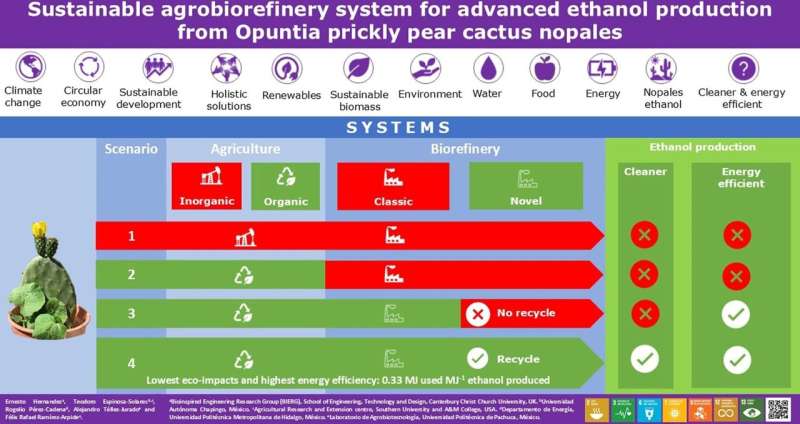
December 17, 2024 by Canterbury Christ Church University
Collected at: https://techxplore.com/news/2024-12-potential-cleaner-efficient-energy.html
Researchers have found a more sustainable way to produce energy using plants that can survive in dry conditions such as deserts.
These drought-tolerant plants, also known as arid plants, could help create cleaner and more efficient biofuels on a large scale. Biofuels are renewable energy sources made from biological materials like plants and algae.
The study was undertaken by researchers from Canterbury Christ Church University in the U.K., Southern University in the U.S., and Universidad Autónoma Chapingo in Mexico.
The desert solution
Arid plants are nature’s survivalists, requiring minimal water, land, and care to flourish. Researchers have identified these resilient plants as sustainable feedstocks, offering a greener alternative for the biofuel industry.
Unlike traditional crops like corn or wheat, which compete with food resources and require intensive care, arid plants grow in harsh conditions and their farming is mostly dry, which avoids moving and separating large volumes of water (normally done in algae harvesting) meaning less pollution and less input of resources, including using energy and machinery.
Project lead and Senior Lecturer in Chemical Engineering Ernesto Hernandez emphasized the importance of the research. “Our agrobiorefinery is cleaner and more energy-efficient, using just a third of the energy required by traditional systems.
“This approach addresses critical debates like the ‘Food for Fuels’ and ‘Land Use Change’ crises, which have made biofuel production controversial.”
A smarter, greener system
The new process integrates agriculture and biorefinery systems into an “agrobiorefinery,” overcoming inefficiencies that have long plagued biofuel production. Traditional biorefineries rely on biomass like algae, corn, and rice straw, which are resource-intensive and contribute to air and water pollution.
Beyond biofuel
Agriculture has been the backbone of human civilization, but modern practices face challenges in balancing economic development with resource conservation. This research demonstrates how aligning agriculture with energy production can yield solutions that support the circular economy while addressing climate change.
From reducing dependence on fossil fuels to reshaping the landscape of sustainable manufacturing, this agrobiorefinery system could play a pivotal role in achieving the United Nations’ Sustainable Development Goals.
Dr. Hernandez added, “This innovation offers a roadmap for cleaner energy production without compromising food security or natural resources. It’s a step forward in turning the challenges of the biofuel industry into opportunities for a greener future.”
Dr. Rafael Ramírez-Arpide of the Universidad Autónoma Chapingo said, “Through life cycle thinking, we can identify hotspots of a process to find more sustainable solutions, as in this case, we analyzed different scenarios to find those that reduce environmental impacts during biofuel production.”
The research, published in Energy Conversion and Management, highlights the results of the study:
- Energy efficiency: The system slashes energy use, requiring only a third of the input energy needed by conventional methods.
- Higher bioethanol yields: Outperforms standard feedstocks like corn stover, bagasse and algae in ethanol production.
- Environmental aims: Scaling this innovation could transform vast stretches of Earth into carbon dioxide-absorbing zones, significantly mitigating global warming.
More information: Ernesto Hernandez et al, Sustainable agrobiorefinery system for advanced ethanol production from Opuntia prickly pear cactus nopales, Energy Conversion and Management (2024). DOI: 10.1016/j.enconman.2024.119052

Leave a Reply